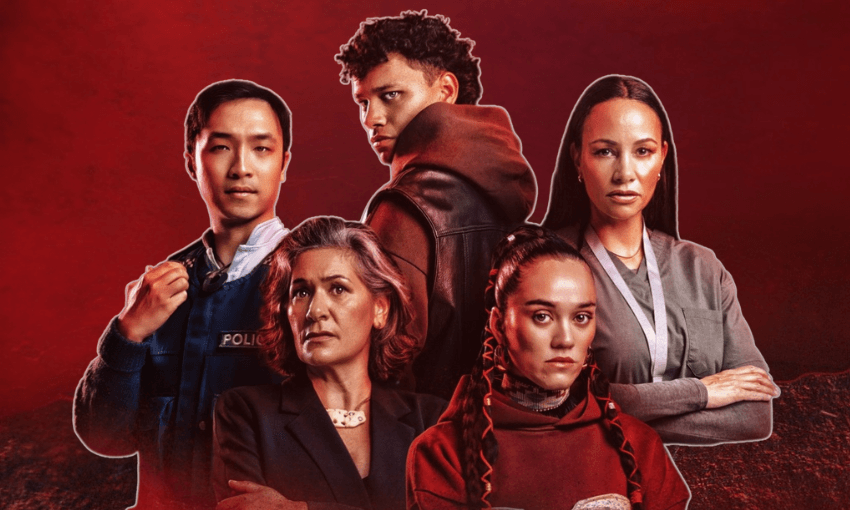A significant exploration of te reo Māori guides Tangata Pai, an ambitious but ponderous new drama series.
In the midst of the government’s controversial regression of te reo Māori in official capacities, Sky has broken the mould and released Tangata Pai on ThreeNow – a drama series with 30% of the dialogue in te reo Māori – in a primetime spot during Te Wiki o te Reo Māori. It’s a defiant celebration of te reo Māori, a first for ThreeNow and a commitment to platforming ambitious Māori content on one of New Zealand’s main networks.
Set in Taranaki, Tangata Pai follows five people as they navigate a land occupation in Aotearoa – an activist musician, a conflicted cop, a grieving nurse, a struggling father and a torn politician. Each is fighting for justice, family and identity. As tensions rise and a terrorist attack shatters their world, they must confront the cost of being good people in a country still reckoning with its past.
Showrunner, creator and director Kiel McNaughton sets a bold precedent with this series. He engages unreservedly with the reo, working with Mereana Hond as poutiaki reo and a kāhui reo team led by Ruakere Hond, there is an authentic application of the Taranaki mita and a thorough and meaningful approach to te reo within the dialogue. It’s these commitments to the language that are vital to an ongoing resurgence of reo Māori content on Aotearoa screens and where Tangata Pai is strongest.
McNaughton furthers his bold approach with a refreshing format. The entire series covers just one hour in the world of the show, the hour leading up to the attack. In each episode, the five characters are each followed in realtime for eight minutes. This structure sets up a captivating ticking clock and intriguing premise that promises a tension-filled path beyond episode one. Telling this story in real time is gutsy – it could be argued it stifles pace but ultimately I think it bolsters the drama.
A still from Tangata Pai. Photo credit:Jinki Cambronero
With the Hīkoi mō te Tiriti, Ihumātao occupation and Bastion point; Aotearoa is no stranger to Māori land protests in recent times. Tangata Pai draws from these influences and smartly centralises the major conflict around this prevailing kaupapa. Although heightened, it does initiate important kōrero about activism, resistance, identity among Māori and volatile political disparities.
However, the overt focus on activism, resistance and identity across all character arcs persists to an overwhelming point. While this kaupapa is significant, it is hamstrung by its own explicitness, leading to a heavy handedness that detracts from the otherwise nuanced production.
Tangata Pai attempts to give us a varied understanding of the conflict through the five main characters. Willa (Ariāna Osborne) is a rising, politically charged Māori musician who struggles with self-doubt and her place in the movement. Miki (Jayden Daniels) is a passionate activist and struggling father who fights to protect his young son from the system he believes is failing their people. Adrian (Yoson An) is a Chinese-Kiwi police officer who wrestles with loyalty and belonging, caught between duty and his heritage. Hinewai (Shavaughn Ruakere) is a nurse and mother who carries the quiet burden of sacrifice and Ahorangi (Nicola Kāwana) is a Māori government minister who walks a political tightrope between tradition and pragmatism.
Ruakere is a stand out among the cast. She deftly portrays a hardened nurse who is going about a stressful yet menial day. There is a groundedness in her performance that is compelling which is supported by a character arc that feels genuine and relatable. She brings an interesting vulnerability to the screen and holds her own across the many single-take shots McNaughton uses. Not all of the takes across the opening episode hold, but hers notably do.
Unfortunately, at times, these characters felt like more of a conduit for themes rather than actualised people, with the exception of Hinewai. Miki looks at Māori mental health; Willa, Māori identity; Ahorangi, loyalty to iwi within politics; and Adrian, a criticism of the policing system. While these give rounded perspectives to the kaupapa, it can feel like those are the only things we know about the characters distancing us from a more connected understanding of these people.
Although stilted by a heavy-handed portrayal, the first episode rockets to an engrossing and anxiety-inducing hook. There is real intention and commitment by McNaughton that pulls the episode together and provides promise for the rest of the series.
Tangata Pai is an ambitious show that pushes itself. In some instances it pays off, and in others it doesn’t. However, it is an achievement that this series has found its way onto a major network heavily platforming meaningful adaptation of te reo Māori in a drama series. This is a first for Threenow, but I doubt it will be the last.

